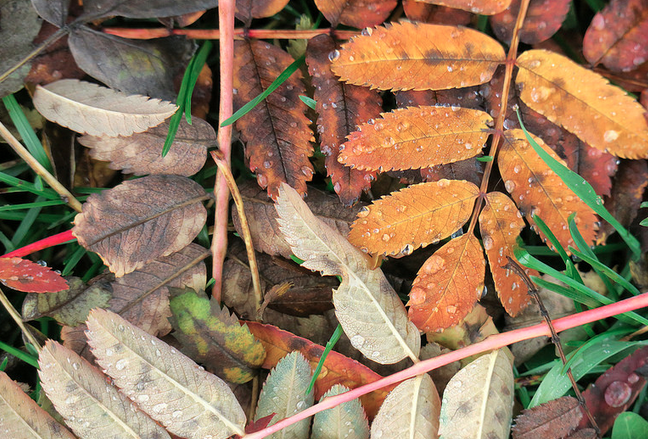Uh-oh, It’s Sneezin’ Season: 10 Tips to Managing Autumn Allergies

Beat sneezin’ season without the drugs (Photo: Flickr/Doug Brown)
Autumn is here. Is your body ready for it? Or are you one of the runny-nosed masses who dreads those Indian summer days because of all the ragweed-filled breezes and sneezes they bring? Well, I’d like to help you change all that – without drugging yourself senseless with Benadryl or prescription drugs. Here are a few of my favorite tricks of the wellness trade to help you welcome the season with open arms, clearer nasal passages and less watery eyes:
1) Get your gut in order.
When your microbiome is in balance, and those billions of bacteria in your gut are being fed well, the more resilient your body is and the less likely it is to succumb to seasonal airborne irritants. In the fall, particularly for those who suffer with allergies, a daily probiotic can keep your microbiome defenses high. Even the World Allergy Organization has recognized the link between an impoverished microbiome and an increased susceptibility to allergens.
2) Don’t eat allergens.
In autumn, when all those ragweed and mold spores are being blown about in the wind, you should be mindful of not eating allergens as well as not breathing them in. Topping the list of edible irritants to eliminate during allergy season, if not year round: processed foods, genetically-modified foods, sugar, gluten, dairy. Back off the caffeine and alcohol, too.
Sensitive to ragweed? Then during the October high season, also consider avoiding the kinds of produce that can aggravate symptoms further, such as bananas, watermelon, cantaloupe, cucumber, tomatoes and zucchini. Also put teas like chamomile, Echinacea, and hibiscus on hold ‘til ragweed season’s past.
3) Clean up your act from the inside out.
If autumnal allergies are an annual downer for you, then take your wellness up a notch and try a cleanse. Doing so will help cut your toxic load, also eliminate most (if not all) of the most common allergens from your diet. Reducing toxins and allergens reduces your vulnerability to the effects of seasonal allergies. Better yet, a cleanse will also lessen the strain on your liver, giving it the support it needs to better manage sneezin’ season.
4) Eat tasty, colorful veggies that tame, not inflame.
What you eat impacts how well your body handles the season. To do it well, look for foods that deliver the allergy-relieving goods. With vitamin A – especially the carotenoids – vitamin C and quercetin on your team, allergic inflammation will have a tough time gaining the upper hand.
Tops on the-tamp down list, not surprisingly, are the power greens – like broccoli, collard greens, kale and celery. Next, add some autumnal orange, like carrots and pumpkin, to your allergy-fighting mix. Top off your tank with onions and garlic which deliver a tasty dose of quercetin which inhibits the release of histamines – the annoying chemical culprit that makes eyes and noses run. Another tip: up your intake of flaxseed oil and zinc for an added anti-allergy boost.
5) Keep allergens off of you.
Pollen clings, so after being outside, peel off your “outdoor clothes” and shoes when you get inside and leave em by the door or a hamper, so you’re not tracking allergens through the house. Shower before bed and wash hair, clothes and sheets frequently – and don’t forget the pillowcases which spend the most time nearest your mouth and nose. If you plan to work outside, raking leaves or harvesting those end-of-season veggies in the garden, consider wearing a surgical or painter’s mask – and try doing outdoor chores late in the day when pollen counts tend to drop.
6) Make a bowl of anti-allergy soup.
Warm up the season with this allergy-fighting, super-simple soup recipe by herb expert James Duke, Ph.D:
Boil an onion (with skin) and a clove of garlic.
Add ½ cup chopped leaves and diced taproots of evening primrose.
After boiling for about 5 minutes, add a cup of nettle leaves and a cup of diced celery stalks, and boil gently for another 3 to 10 minutes.
Before eating, remove the onion skins and eat the soup while it’s still warm. Season with wine vinegar, black pepper, hot pepper, turmeric, curry powder, or celery seed.
BE WELL BONUS:
Other easy-to-incorporate allergy-fighting tips:
Give your nose a rinse: Use a traditional neti pot or saline solution spray to rinse sinuses and nasal passages
Get steamed: Try taking a sauna or two every week during allergy season to help relieve sinus congestion, aid relaxation and boost immunity
Skip the convertible: Drive with the windows up, not the top down!
Lay off the drugs: Instead consider a natural, non-pharmaceutical product with a targeted blend of nutrients and botanicals, like Allergy Support Formula, which support immune balance during the allergy season.
By Dr. Frank Lipman
More From Dr. Frank Lipman:

